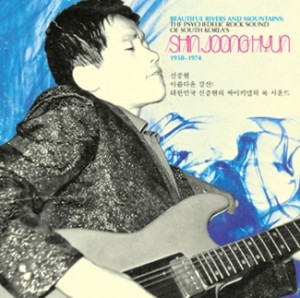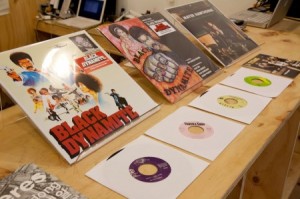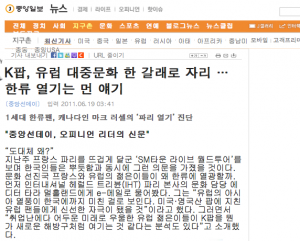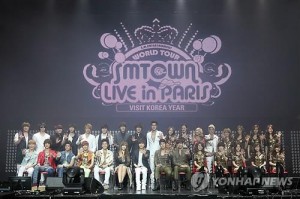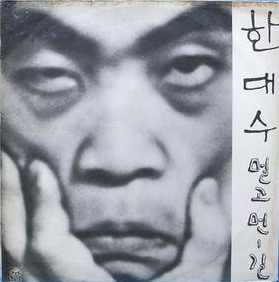– Kim Kiduk is pissed off. Again. This time, he sent out a press release for POONGSAN (which he wrote and produced), complaining about how hard it is for different kinds of films to get screens in Korea, which tend to be dominated by blockbusters (sorry, no link… but I have been looking for one).
Which is true enough … although I notice that this sort of rant rarely talks about the responsibility a filmmaker has to audiences, to make something they might want to see. Or the responsibility of audiences to see non-blockbusters. If there were hordes of people pushing to get into indie films, which were being forced out of theaters while still doing good business, then I would be much more sympathetic. But if a theater owner can make X dollars with an indie film, and 10X with a blockbuster, why should the owner take a loss? Just to make Kim Kiduk and other self-important artistes feel better? That’s culture?
Ezra Pound had a great quote:
Music begins to atrophy when it departs too far from the dance… poetry begins to atrophy when it gets too far from music
And I think there is a similar delicacy to movies. They atrophy when they get too far from the dance. They might be a slow dance, a tango, a Lindy Hop or a late-night techno crunk, but they still dance.
(Of course, everything atrophies when it gets too close to money, so the opposite is not great either).
– Anyhow, I think my point is, if people are not enjoying the art you think they should, maybe you should do something about it, rather than just complain. Get aggressive with social media and personal marketing. If audiences don’t “get” your film, engage and work with them, help show them what there is to get.
Or turn to writing or comics (much cheaper than making movies). But if you want to spend millions of dollars to tell a story and it is not your money, don’t be surprised if people get all money-minded.
I also hate it when indie musicians complain about not being well supported in Korea, but then do precious little to make the scene better. They sit around complaining about how everyone else is failing, but do not take charge of their own lives and careers. Happily, though, that is beginning to change, and I think a lot of bands are being a lot more active about promoting themselves, getting better, and building the scene.
– After being out about a month, TRANSFORMERS 3: DAFT SIDE OF THE LOON looks like it is following the last two Transformers movies, making oodles of money at the box office in Korea. TRANSFORMERS was the top foreign film ever in Korea when it came out, with 7.3 million admissions. TRANSFORMERS 2 did slightly better with 7.4 million. And now, TRANSFORMERS 3 has 6.9 million admissions and is still going strong (637,000 admissions last weekend). So I think it has a very good chance of overtaking both of its predecessors.
(Of course, AVATAR kicked everyone’s butts last year, topping 13 million admissions and becoming the biggest film ever in Korea).
– HARRY POTTER AND THE DEATHLY HALLOWS: PART 2 did okay in Korea, in its debut weekend, with 1.7 million admissions — okay, but not great. But whenever a HARRY POTTER film comes out, I always remember what it was like when the first one was released. I was working at the JoongAng Ilbo at the time, and when a reporter asked about the title, I thought it best to go with the story’s original title: HARRY POTTER AND THE PHILOSOPHER’S STONE. Turns out Warner Bros. hated that (they wanted the American dummy title, THE SORCERER’S STONE), and yelled at the reporter. A lot.
HARRY POTTER AND THE CHAMBER OF SECRETS was really huge, but standards have really changed since then. It opened on 295 screens, about a third of all the screens in Korea then — today, there are around 2,000 screens, and big openings can get up to 900 screens. CHAMBER OF SECRETS was the biggest opening weekend Korea had ever seen then … with 1 million admissions. Today, plenty of films have opened to over 2 million.
The first two Potter films had around 4 million admissions (if I recall correctly), but since then, the others have been in the 2-3 million admission range.
– I’m pretty ambivalent about DEATHLY HALLOWS: PART 2, for what it’s worth. Yes, I was one of the lemmings that saw it opening weekend. It was definitely the most action-filled of the Potter films. And the CGI was really impressive — at times, even beautiful. The contrast between it and the first couple of Potter films is incredible (with their second-rate effects, bad child actors and really dull direction). But despite all its good points, I can barely remember DEATHLY HALLOWS 2. And at its core, HP is yet another “chosen one”, might-makes-right superhero story, far more American than British (despite the public school trappings). And it makes me want to re-read the original BOOKS OF MAGIC miniseries.
– The Korean film SUNNY is still chugging along, doing impressive business. It opened May 4, but it is still in third place, with 6.9 million admissions. But of course I have not had a chance to see it, so I don’t have any real opinions about it.
– Oh, POONGSAN has had nearly 700,000 admissions since its release on June 23, in case you are interested.
